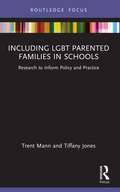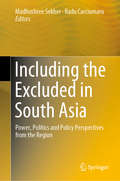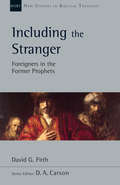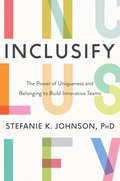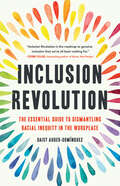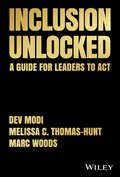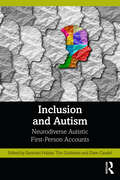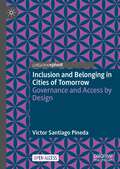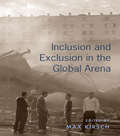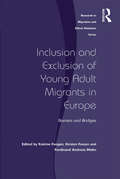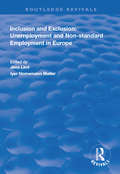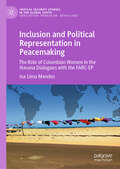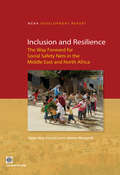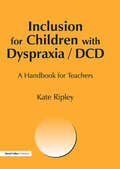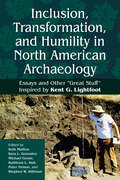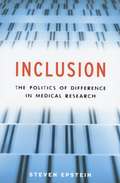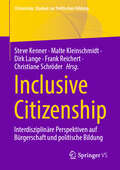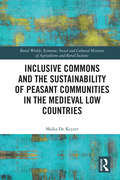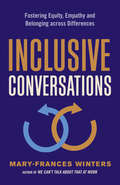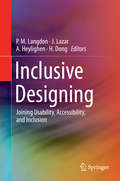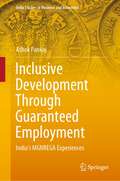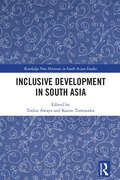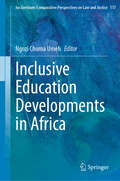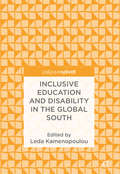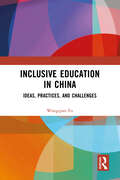- Table View
- List View
Including LGBT Parented Families in Schools: Research to Inform Policy and Practice
by Tiffany Jones Trent MannThis book explores the experiences of LGBTQ+ parented families in school communities and provides a voice for this overlooked group who are becoming an increasingly common form of family diversity in school communities. Approaching the topic from a strength-based psychological perspective, the book presents LGBTQ+ parents’ suggestions for school improvements and supportive structures and provides empirical evidence to inform future LGBTQ+ inclusive educational policy. Research based yet practically focused, it will be a valuable resource for researchers, students and education professionals alike.
Including the Excluded in South Asia: Power, Politics and Policy Perspectives from the Region
by Madhushree Sekher Radu CarciumaruThis book analyses and discusses the multiple dimensions of social exclusion/inclusion seen in South Asia. It not only captures how ‘social exclusion’ is intrinsic to deprivation or deprivation in itself, but also the processes of political engagement and social interactions that the socially excluded develop as strategies and networks for their advancement. Consequently, the book goes beyond structures or agency, and examines the question of a more dynamic approach to provide spaces for the ‘socially excluded’ to self-manage exclusion, thereby raising discussions around the contested positions that underlie development discourse on social inequality.While social exclusion linked to identities is studied, the book argues that hierarchies and inequalities based on social identities cut across and affect various groups of excluded. Consequently, these phenomena create or lead to various processes of exclusion. The book illustrates that social exclusion should not be limited to privileging the differences that characterize the exclusionary processes, but should also comprise underpinning strategies of ‘inclusion’, emphasizing the need to focus on imperatives ‘to include’. As a result, the book acknowledges that social exclusion is not limited to analyzing the different identities that face exclusion, but also understanding the systems and processes that create social exclusion, or create opportunities for inclusion of the excluded.The book addresses readership across academic disciplines (including in the growing field of state capacity and governance), and practitioners (administrators and policy-making communities). Conclusively, the book, provides a platform to intensively exchange the multifaceted and critical issue of social exclusion/inclusion, and thus contributes to inclusive sustainable development discourse.
Including the Stranger: Foreigners in the Former Prophets (New Studies in Biblical Theology #Volume 50)
by David G. FirthThe Old Testament, particularly the Former Prophets (Joshua, Judges, 1-2 Samuel, and 1-2 Kings), has frequently been regarded as having a negative attitude towards foreigners. This has meant that these texts are often employed by those opposed to the Christian faith to attack the Bible—and such views can be echoed by Christians. While the story of David and Goliath is cherished, other episodes are seen to involve "ethnic cleansing" or "massacre" and are avoided. David Firth's contention is that this approach emerges from an established interpretation of the text, but not the text itself. In this New Studies in Biblical Theology volume, he argues that the Former Prophets subvert the exclusivist approach in order to show that the people of God are not defined by ethnicity but rather by their willingness to commit themselves to the purposes of Yahweh. God's purposes are always wider than Israel alone, and Israel must therefore understand themselves as a people who welcome and include the foreigner. Firth addresses contemporary concerns about the ongoing significance of the Old Testament for Christians, and shows how opponents of Christianity have misunderstood the Bible. His reading of the Former Prophets also has significant ethical implications for Christians today as they wrestle with the issues of migration and what it means to be the people of God. Addressing key issues in biblical theology, the works comprising New Studies in Biblical Theology are creative attempts to help Christians better understand their Bibles. The NSBT series is edited by D. A. Carson, aiming to simultaneously instruct and to edify, to interact with current scholarship and to point the way ahead.
Inclusify: The Power of Uniqueness and Belonging to Build Innovative Teams
by Stefanie K. JohnsonIn this groundbreaking guide, a management expert outlines the transformative leadership skill of tomorrow—one that can make it possible to build truly diverse and inclusive teams which value employees’ need to belong while being themselves. Humans have two basic desires: to stand out and to fit in. Companies respond by creating groups that tend to the extreme—where everyone fits in and no one stands out, or where everyone stands out and no one fits in. How do we find that happy medium where workers can demonstrate their individuality while also feeling they belong?The answer, according to Stefanie Johnson, is to Inclusify. In this essential handbook, she explains what it means to Inclusify and how it can be used to strengthen any business. Inclusifying—unlike “diversifying” or “including”— implies a continuous, sustained effort towards helping diverse teams feel engaged, empowered, accepted, and valued. It’s no use having diversity if everyone feels like an outsider, she contends.In her research, Johnson found common problems leaders exhibit which frustrate their attempts to create diverse and cohesive teams. Leaders that underestimated the importance of group coherence and dynamics often have employees who do not feel like they belong; leaders that ignore the benefits of listening to different perspectives leave some people feeling like they cannot be their authentic selves.By contrast, leaders who Inclusify can forge strong relationships with their teams, inspire greater productivity from all of their workers, and create a more positive environment for everyone. Having a true range of different voices is good for the bottom line—it allows for the development of the best, most innovative, and creative solutions that are essential to success. Inclusify reveals the unexpected ways that well-intentioned leaders undermine their teams, explains how to recognize the myths and misperceptions that drive these behaviors, and provides practical strategies to become an Inclusifyer. By learning why uniqueness and belonging are so imperative, leaders can better understand what makes their employees tick and find ways to encourage them to be themselves while ensuring they feel like they are fully part of the group. The result is a fully engaged team filled with diverse perspectives—the key to creating innovative and imaginative ideas that drive value.
Inclusion Revolution: The Essential Guide to Dismantling Racial Inequity in the Workplace
by Daisy Auger-DomínguezA leading diversity executive offers step-by-step guidance for confronting racial bias in the workplace We are in the midst of a global reckoning on race, and corporations are on high alert. But conventional approaches have fallen short, leaving nagging questions about next steps. Why do diversity trainings fail? What&’s so wrong with a company&’s &“colorblind&” workplace culture? In Inclusion Revolution, Daisy Auger-Domínguez provides frank answers to why popular efforts fail. She then presents the definitive roadmap for revolution, through her dynamic step-by-step process: Reflect, Visualize, Act, and Persist. She offers proven, research-based strategies for racially inclusive management. Racial inequality in the workplace is a problem we can solve. Inclusion Revolution offers the necessary tools for managers to address issues of race, power, and exclusion, to build change that lasts. Because through the best teams, companies can finally create a stronger future.
Inclusion Unlocked: A Guide for Leaders to Act
by Marc Woods Dev Modi Melissa C. Thomas-HuntInclusion Unlocked is the definitive guide for business leaders to unlock the power of diversity and enable inclusion to flourish in their organisations In Inclusion Unlocked a team of accomplished leadership experts deliver an insightful set of solutions to the obstacles that block progress and prevent leaders from delivering on the diversity results their employees, customers and investors demand. Written by authors whose core areas of expertise are inclusion and diversity, this book will provide an Inclusive Leader Scorecard model, access to an online diagnostic tool, and proven strategies that enable greater belonging. As well as this, Inclusion Unlocked provides first-hand accounts of how well-known CEOs, Chief People Officers and Chief Diversity Officers have accelerated progress in their diversity initiatives, and the pitfalls they have learnt to avoid. The authors explain how business leaders can act as a driving force for change if they use the right mindset and tools. You’ll also discover: How to understand the relevance of inclusive leadership to impressive business growth How to identify the key levers for change and progress by cutting through the complexity Strategies that enable greater belonging, psychological safety, and innovationAn indispensable resource for business leaders, HR and DEI practitioners who want a practical and easy to follow guide for advancement in diversity initiatives. Inclusion Unlocked is the inclusion toolkit needed to make significant progress.
Inclusion and Autism: Neurodiverse Autistic First-Person Accounts
by Santoshi Halder, Tim Goldstein and Dave CaudelThis book provides a fertile ground for having the collective voices of the autistic people to understand inclusion and the enigma of the autism spectrum from the neurodiverse lens. The book brings forth the first-person account of autistic adults and unravels various facts about autism spectrum disorder. It offers a fresh outlook on autistic adults, reflecting on inclusion, their challenges, and strengths presenting crucial elements for a successful inclusive model and the foundation of a robust and effective support delivery reinforcing the inclusion of autistic people in society. Through a range of neurodiverse voices, the book presents the world their unique perspectives. It offers valuable insights for future directions and strategic effective pathways stressing the need for a neuro-diverse lens and strength-based focus of support for manifestation and nurturance of abilities and strengths of people.Inclusive and incisive in its making, this book would be useful to the departments of Special Education, Psychology and Applied Psychology, Social Work, Sociology, and Public Health. It would also be an invaluable companion to special educators, in-service and prospective teachers, policy makers, parents, professionals from government and non-government departments, and researchers in the field of disability, diversity, and equity from around the world.
Inclusion and Belonging in Cities of Tomorrow: Governance and Access by Design
by Victor Santiago PinedaThis open access book uncovers the historical context and entrenched beliefs that have perpetuated exclusionary urban landscapes and disadvantage for marginalized groups. It offers an in-depth exploration of the intricate interplay of geographical space, recognizing its pivotal role in shaping our cities and exacerbating spatial injustice. The construction industry, a vital agent in forging accessible environments, often falls short in accommodating persons with disabilities and older individuals. This important book underscores the urgent need for integrated approaches woven into the fabric of cities, companies, and the construction industry itself, to ensure universal accessibility. Drawing upon practical strategies and compelling case studies, the book presents actionable frameworks such as the DisCo Policy Framework and the Iceberg of Inequality Model, facilitating the assessment of progress towards achieving radical inclusion. Inviting readers to embark on a journey into the cities of tomorrow, where inclusion and belonging are the norm, it concludes with a simple idea: the future is accessible.
Inclusion and Exclusion in the Global Arena
by Max KirschThis collection of essays addresses the inclusion and exclusion of peoples, populations and regions in an era of global economic and social integration. Although many publications have discussed the way in which globalization has changed the nature of boundaries, space and the movement of peoples, there is a wide gap in a literature that rarely addresses the reaction of local communities and inclusion for some stakeholders in decision making while excluding others, particularly in regard to global integration of industry, the legislation of planning, and trade. This gap has often led to narrow and sometimes misleading ways of presenting the results of globalizing processes. This collection aims to bridge this gap by providing on-the ground case studies that lead to alternative ways of viewing current conceptual frameworks of globalization and its consequences. This collection is an elaboration of a special issue of Urban Anthropology that contained essays by June Nash, Jack Goody, Helen Safa and Max Kirsch. The special issue addressed concerns that have become prominent not only in anthropology but in the wider social sciences and humanities. The reader focuses on the conceptual divisions among the constructs of space and place, indigenous strategies for autonomy, polity and global planning mechanisms, and the role of trans-national corporations in community disintegrations and resistance.
Inclusion and Exclusion of Young Adult Migrants in Europe: Barriers and Bridges
by Katrine Fangen Kirsten Fossan Ferdinand Andreas MohnInclusion and Exclusion of Young Adult Migrants in Europe presents analyses of research carried out during the course of the EUMARGINS research project, exploring the inclusion and exclusion of young adult immigrants across a range national contexts, including the Nordic welfare states, old colonial countries, Southern European nations and the Eastern European region. Scrutinising legal, policy and historical sources, as well as participation in labour market and education systems, this volume engages with multiple social arenas and spheres, to integrate research and provide a cohesive investigation of the dynamics of each national setting. In addition to the chapters focused on individual national contexts (Estonia, France, Italy, Norway, Spain, Sweden and the UK), the book also provides a comprehensive transnational analysis, developing a comparative perspective and explaining the overarching research framework. A carefully organized and comprehensive exploration of the exclusion and inclusion of young adult migrants in Europe, Inclusion and Exclusion of Young Adult Migrants in Europe will appeal to social scientists with interests in migration, population change, integration and exclusion.
Inclusion and Exclusion: Unemployment And Non-standard Employment In Europe (Routledge Revivals)
by Iver Hornemann Møller Jens LindPublished in 1999, this text is influenced by two sets of theories, namely regulation theories and theories on social citizenship. Regulation theories are mainly used as an overall guideline - a frame of reference - in the analysis of changed, unchanged and new types of integration and differentiation in working life and its social modes of regulations. The perspective on social citizenship is concentrated on participation in working life - what are the changes in working life (unemployment and non-standard employment) and what are the conditions and the outcome of social regulation? These questions are thematized in two articles and analyzed in chapter 7 which focuses on four welfare state models represented by Portugal, England, the Netherlands and Denmark. The book aims to contribute material on labour market segmentation and social policies to combat labour market marginalization in four countries studies representing typical European welfare state models.
Inclusion and Political Representation in Peacemaking: The Role of Colombian Women in the Havana Dialogues with the FARC-EP (Critical Security Studies in the Global South)
by Isa Lima MendesThis book addresses the issue of societal inclusion in peacemaking from a conceptual viewpoint seldom mobilized by Conflict Resolution literature: the one of political representation. It reviews how the inclusion debate enters and is developed within the peace and conflict field, proposing, instead, to analyze it through the theoretical lens of political representation. Claiming that it provides better tools to understand the social articulations, oppressions and tensions behind political dynamics inherent to the limited space of the negotiation table, the book discusses the role played by Colombian women in the Havana Dialogues with the former FARC-EP. Whereas articulated women&’s movements were able to overcome initial hesitation concerning their inclusion and had real impact in the final agreement, ultimately both inclusions and exclusions are involved in (and stem from) such representation.
Inclusion and Resilience
by Victoria Levin Matteo Morgandi Joana SilvaThe report aims to meet two broad objectives: (a) enhance knowledge about the current state of existing social safety nets (SSNs) and assess their effectiveness in responding to new and emerging challenges to the poor and vulnerable in the region by bringing together new evidence, data, and country-specific analysis; and (b) open up and inform a debate on feasible policy options to make SSNs in the Middle East and North Africa more effective and innovative. The first chapter, 'a framework for SSN reform,' describes and illustrates the reasons for the region's growing need for SSN reform and establishes the framework for renewed SSNs. It identifies key goals for SSNs (promoting social inclusion, livelihood, and resilience) and illustrates how these goals have been achieved in some parts of the region and elsewhere. The second chapter, 'key challenges that call for renewed SSNs,' analyzes the challenges facing the region's poor and vulnerable households, which SSNs could focus on as a priority. Two large groups are at higher-than-average poverty risk: children and those who live in rural or lagging areas. The third chapter, 'the current state of SSNs in the Middle East and North Africa,' analyzes SSN spending and assesses different aspects of the SSN systems' performance. The fourth chapter, 'the political economy of SSN reforms in the Middle East and North Africa: what do citizens want?' presents new evidence on citizens' preferences concerning redistribution and SSN design, using newly collected data. It also discusses how political economy considerations could be taken into account in designing renewed SSNs in the region. The fifth chapter, 'the way forward: how to make safety nets in the Middle East and North Africa more effective and innovative,' proposes an agenda for reform and the path for moving forward, using global experience and the evidence presented in the preceding chapters.
Inclusion for Children with Dyspraxia: A Handbook for Teachers
by kate RipleyThis book is about children with dyspraxia: developmental co-ordination disorders (DCD) and what teachers and other professionals can do to promote their learning and their social inclusion in a mainstream setting. The author addresses issues which affect access to the curriculum in Key Stages 1-4 and offers strategies to support children which have proved effective to experienced practitioners and can be managed in a group or class context. A key component of the book is an understanding of the emotional and social needs of children with dyspraxia.
Inclusion, Transformation, and Humility in North American Archaeology: Essays and Other “Great Stuff” Inspired by Kent G. Lightfoot
by Stephen W. Silliman Seth Mallios, Sara L. Gonzalez, Michael Grone, Kathleen L. Hull, Peter NelsonIn a dynamic near half-century career of insight, engagement, and instruction, Kent G. Lightfoot transformed North American archaeology through his innovative ideas, robust collaborations, thoughtful field projects, and mentoring of numerous students. Authors emphasize the multifarious ways Lightfoot impacted—and continues to impact—approaches to archaeological inquiry, anthropological engagement, indigenous issues, and professionalism. Four primary themes include: negotiations of intercultural entanglements in pluralistic settings; transformations of temporal and spatial archaeological dimensions, as well as theoretical and methodological innovations; engagement with contemporary people and issues; and leading by example with honor, humor, and humility. These reflect the remarkable depth, breadth, and growth in Lightfoot’s career, despite his unwavering stylistic devotion to Hawaiian shirts.
Inclusion: The Politics of Difference in Medical Research (Chicago Studies In Practices Of Meaning Ser.)
by Steven EpsteinWith Inclusion, Steven Epstein argues that strategies to achieve diversity in medical research mask deeper problems, ones that might require a different approach and different solutions. Formal concern with this issue, Epstein shows, is a fairly recent phenomenon. Until the mid-1980s, scientists often studied groups of white, middle-aged men—and assumed that conclusions drawn from studying them would apply to the rest of the population. But struggles involving advocacy groups, experts, and Congress led to reforms that forced researchers to diversify the population from which they drew for clinical research. While the prominence of these inclusive practices has offered hope to traditionally underserved groups, Epstein argues that it has drawn attention away from the tremendous inequalities in health that are rooted not in biology but in society. “Epstein’s use of theory to demonstrate how public policies in the health profession are shaped makes this book relevant for many academic disciplines. . . . Highly recommended.”—Choice “A masterful comprehensive overview of a wide terrain.”—Troy Duster, Biosocieties
Inclusive Citizenship: Interdisziplinäre Perspektiven auf Bürgerschaft und politische Bildung (Citizenship. Studien zur Politischen Bildung)
by Dirk Lange Malte Kleinschmidt Frank Reichert Steve Kenner Christiane SchröderInclusive Citizenship ist ein Konzept, das in diesem Band theoretisch und empirisch in den Blick genommen wird. Die Autor*innen betrachten Citizenship und Inklusion als soziale Praktiken aus verschiedenen Perspektiven und in verschiedenen gesellschaftlichen Feldern wie Gender und Migration, Lernen und Bildung, Digitalisierung, Medizin und Kulturerbe. Anhand von vielen empirischen Beispielen und theoretischen Impulsen wird so das Konzept geschärft, mit dem die inkludierenden und exkludierenden Aspekte von Citizenship ebenso in den Blick kommen wie die Dimensionen Status und Performativität.
Inclusive Commons and the Sustainability of Peasant Communities in the Medieval Low Countries (Rural Worlds)
by Maïka De KeyzerIs inclusiveness in the commons and sustainability a paradox? Late medieval and Early Modern rural societies encountered challenges because of growing population pressure, urbanisation and commercialisation. While some regions went along this path and commercialised and intensified production, others sailed a different course, maintaining communal property and managing resources via common pool resource institutions. To prevent overexploitation and free riding, it was generally believed that strong formalised institutions, strict access regimes and restricted use rights were essential. By looking at the late medieval Campine area, a sandy, infertile and fragile region, dominated by communal property and located at the core of the densely populated and commercialised Low Countries, it has become clear that sustainability, economic success and inclusiveness can be compatible. Because of a balanced distribution of power between smallholders and elites, strong property claims, a predominance of long-term agricultural strategies and the vitality of informal institutions and conflict resolution mechanisms, the Campine peasant communities were able to avert ecological distress while maintaining a positive economic climate.
Inclusive Conversations: Fostering Equity, Empathy, and Belonging across Differences
by Mary-Frances Winters"What is impressive is not only how Winters builds a case for the urgency and need for bold, inclusive conversations but that she also gives specific strategies and competencies to turn her theory into practice.-Dr. Sheila Robinson, publisher and CEO, Diversity Woman MediaEffective dialogue across different dimensions of diversity, such as race, gender, age, religion, or sexual orientation, fosters a sense of belonging and inclusion, which in turn leads to greater productivity, performance, and innovation. Whether in the workplace, faith communities, or educational settings, our differences can tear us apart rather than bring us together if we do not know how to communicate. Recognizing our collective responsibility to earnestly address our differences and increase understanding and empathy will not only enhance organizational goals but will also lead to a healthier, kinder, and more compassionate world.Award-winning diversity, equity, and inclusion consultant Mary-Frances Winters has been leading workshops on what she calls Bold, Inclusive Conversations for years. In this book she offers specific dialogue strategies to foster greater understanding on the following topics: Recognizing the importance of creating equity and sharing power Dealing with the "fragility" of dominant groups--their discomfort in engaging with historically subordinated groups Addressing the exhaustion historically marginalized groups feel from constantly explaining their different lived experience Exploring how to build trust and create psychologically safe spaces for dialogueThis guide is comprehensive for anyone who wants to break down the barriers that separate us and facilitate discussions on potentially polarizing topics.
Inclusive Designing
by P. M. Langdon J. Lazar A. Heylighen H. Dong'Inclusive Designing' presents the proceedings of the seventh Cambridge Workshop on Universal Access and Assistive Technology (CWUAAT '14). It represents a unique multi-disciplinary workshop for the Inclusive Design Research community where designers, computer scientists, engineers, architects, ergonomists, policymakers and user communities can exchange ideas. The research presented at CWUAAT '14 develops methods, technologies, tools and guidance that support product designers and architects to design for the widest possible population for a given range of capabilities, within a contemporary social and economic context. In the context of developing demographic changes leading to greater numbers of older people and people with disabilities, the general field of Inclusive Design Research strives to relate the capabilities of the population to the design of products. Inclusive populations of older people contain a greater variation in sensory, cognitive and physical user capabilities. These variations may be co-occurring and rapidly changing leading to a demanding design environment. Recent research developments have addressed these issues in the context of: governance and policy; daily living activities; the workplace; the built environment, Interactive Digital TV and Mobile communications. Increasingly, a need has been identified for a multidisciplinary approach that reconciles the diverse and sometimes conflicting demands of Design for Ageing and Impairment, Usability and Accessibility and Universal Access. CWUAAT provides a platform for such a need. This book is intended for researchers, postgraduates, design practitioners, clinical practitioners, and design teachers.
Inclusive Development Through Guaranteed Employment: India’s MGNREGA Experiences (India Studies in Business and Economics)
by Ashok PankajThis book examines the inclusive development experiences and impacts of the Mahatma Gandhi National Rural Employment Guarantee Scheme (MGNREGS). It discusses the theoretical assumptions underlying the inclusive development of Employment Guarantee Scheme (EGS), and draws conclusions based on robust data and real-world experiences with the MGNREGS – which has attracted global attention as India’s most ambitious, rights-based development initiative and most expansive work-based social security measure, the world’s largest public works programme, and people-centric approach to development. The book argues that the Scheme holds vast potential, and, in fact, has made significant contribution to the promotion of livelihoods of the poorest of the poor, but that the weak institutions of local-self-governance, entrusted for implementation of the Scheme, are incapable of exploiting them to the full. It ends with a concrete policy suggestion: the inclusive development experiences gathered with the EGS and presented here could offer a source of policy change in many developing Afro-Asian countries whose situations are similar to India’s, provided the local conditions in the respective country are taken into consideration when designing the EGS. Its significance as a social security measure has increased in post-COVID loss of jobs and livelihoods of the poor.
Inclusive Development in South Asia (Routledge New Horizons in South Asian Studies)
by Toshie Awaya Kazuo TomozawaThis book examines the multi-layered aspects and the complexities of inclusive development in South Asia based on recent data and using innovative methodology. The book offers an analysis of the existing ground realities in terms of economic and inclusive development, presenting relevant discussion and findings. It discusses lower castes, tribes, religious/ethnic minorities, and other socially vulnerable people, as well as gender, rural-urban, and educational disparities in South Asia, and highlights that all these issues are interrelated. Structured in four parts - Spatial Dimensions, Labour and Migration Dimensions, Social Dimensions, and Beyond Inclusion - the chapters present emerging new concepts of related to socio-economic and inclusive development and use effective and valid methods and methodology covering the ground realities-based information and secondary data-based analysis. Evaluating the extent to which inclusive development has been realised in South Asia, the contributors explore a new approach toward the concept of ‘inclusiveness’ through drawing on the experiences of the diverse societies in South Asia. An immensely useful contribution to the analysis of different economic and social issues on different countries in South Asia, focusing on inclusivity, this book will be of interest to researchers working on South Asian Politics and Development Economics.
Inclusive Education Developments in Africa (Ius Gentium: Comparative Perspectives on Law and Justice #117)
by Ngozi Chuma UmehThis book contributes to the discourse on disability in Africa as an issue of systemic exclusion characterized by the discrimination and often complete segregation of persons with disabilities (PWDs) in various African countries. Despite the inclusive promise of the Convention on the Rights of Persons with Disabilities (CRPD) as well as the Protocol to the African Charter on Human and Peoples’ Rights on the Rights of Persons with Disabilities in Africa, the situation has not actually improved for PWDs in Africa. Given the powerful evidence of the devaluation of PWDs in connection with the COVID-19 pandemic, it is high time to reflect on the experiences of persons with disabilities in education, along with other forms of discrimination they encounter. The book’s respective chapters assess how well the existing legal frameworks, policies and practices in most African countries have met the needs for inclusion of children and adults with disabilities. The social and economic rights of persons with disabilities are protected in the constitutions of most countries and enshrined in the normative frameworks that most African leaders have adopted and ratified. These commitments need to be borne in mind when thinking about the present and the future. Inclusive development is an investment and must be viewed as part of a package of reforms that are connected to substantive social protection and improvements in realizing other socio-economic goods. Indeed, a range of alliances are needed to advance the goals of ‘leaving no one behind’, ensuring ‘education for all’, and delivering on the African Union’s call for the development of policies, programmes and requisite budgets for the realization of inclusive education for persons with disabilities.
Inclusive Education and Disability in the Global South
by Leda KamenopoulouThis edited volume examines inclusive education and disability in the global South. Presenting four qualitative research studies conducted in Malaysia, Bhutan, Philippines and Belize, the authors examine the implementation of inclusive education and disabled children’s participation in the education system: contexts on which very little is known. Thus, this book provides a unique opportunity to access rare context-specific information concerning this region of the world; and to reflect on the particular challenges some countries face in the realization of full participation of all children within education. Authored by researchers who are also teaching professionals with experience and understanding of the complexities of the real world, this book reminds us that researchers and policy makers must listen to all voices and perspectives: especially those that have remained silenced and ignored.
Inclusive Education in China: Ideas, Practices, and Challenges
by Wangqian FuBy adopting a comparative approach, this book investigates the philosophy, policy, practices, and challenges of inclusive education in the Chinese contexts, recognizing influences of Chinese culture, such as Confucianism, collectivism, and familism. In the 1980s, the Chinese government promoted a policy named “Learning in Regular Classroom” to ensure educational rights for children with disabilities, which subsequently turned into an inclusive education program in the western sense. Starting from this point, the policy and practice of inclusive education have developed tremendously. To facilitate reflection and future development, this is the latest and most comprehensive attempt at understanding the status quo of inclusive education in China from a variety of perspectives: from early childhood to higher education, from family to schools and communities, from peers to teachers and parents. It also analyzed the unique Chinese philosophy of inclusive education, adding to current debates with a Chinese lens. This book will appeal to academics, students, and practitioners in disciplines such as education, early childhood studies, sociology, social work, social policy, disability studies, and youth studies.
